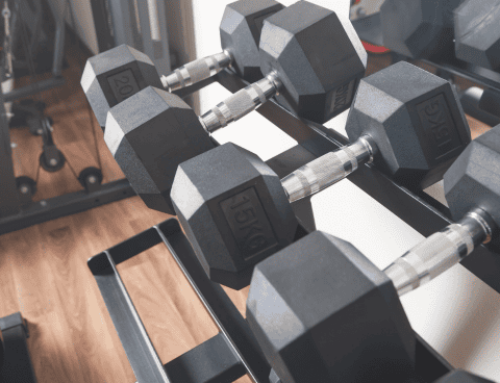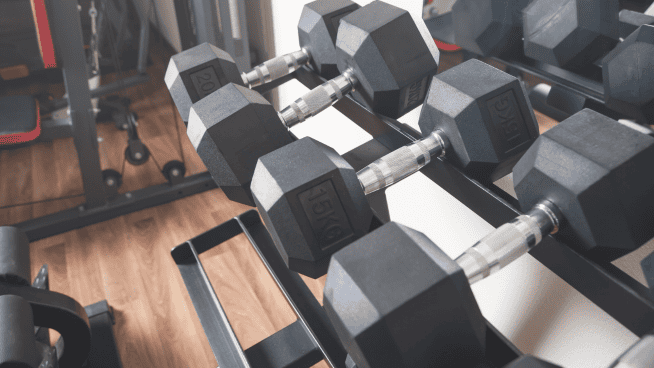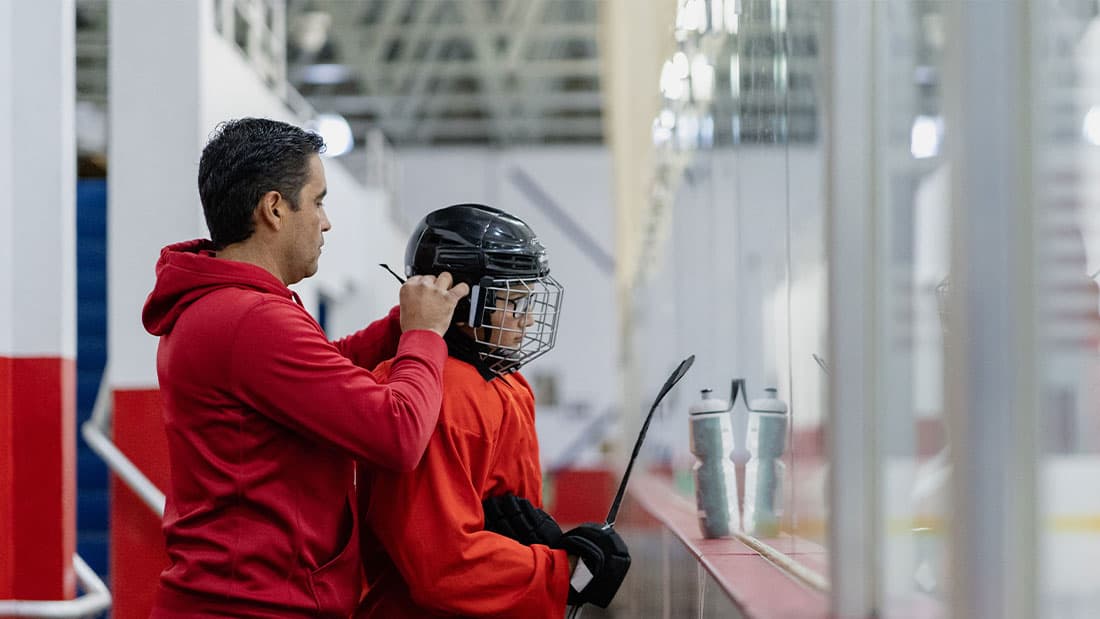Why High School Athletes Shouldn’t Obsess Over the Number on The Scale
One of the most popular places to be in my weight room is around the scale.
I have teen athletes checking every single day to see if they have “gained weight.” The No. 1 desire of nearly every young male athlete is to bulk up. But this obsession regarding the number on the scale can be counterproductive for a variety of reasons.
If you are attempting to gain weight, it is safe to assume you want to gain muscle mass. But the number on that scale can vary widely from day to day, often due to factors that have nothing relating to you gaining or losing muscle. Most people’s weights fluctuate about 3 to 6 pounds each day due to factors like hydration status, time of day, activity level and what/when they ate. Stepping on the scale in varying amounts of clothing can change the number even further.
So if you step on the scale one day and see you’re a pound heavier than the last day, you did not “gain a pound of muscle.” It is virtually impossible to gain a pound of muscle within a day, or even a couple days. If you’re a lanky teen who’s generally been the same weight and at the same level of activity for a while now, you’re going to need hundreds of extra calories in your diet each day for a considerable amount of time before you can gain a pound of muscle. According to the Food and Nutrition Board of the Institute of Medicine, male high school athletes usually need between 3,000 and 6,000 calories a day just to maintain their weight, and many teen athletes don’t eat nearly enough. It’s simply impossible to gain a pound of muscle within one day—the body just doesn’t work like that. Over a week or two? Maybe. But building muscle is not something done overnight.
So when the scale tells you that you are 2 pounds heavier than you were yesterday, you didn’t gain 2 pounds of muscle—you probably just have more water or food in your system than when you weighed yourself yesterday. This also works inversely. To lose 1 pound of body weight, you need a deficit of 3,500 calories. That would be extremely difficult and potentially dangerous to achieve in a day. If the scale says you weigh a couple pounds less than you did yesterday, your muscle hasn’t suddenly evaporated—you probably just need to drink and eat more.
Diving into this a bit further, good weight is not gained fast. When I say “good weight,” I mean additional body mass that consists of a high ratio of muscle to fat. Fast weight gain is not a positive for athletes looking to get bigger. I have had numerous athletes come to me saying they gained 10-15 pounds in the last two weeks. I typically know that these numbers are exaggerated, but even 8-10 pounds in a month can be considered rapid weight gain.
The problem with gaining weight this fast is that you cannot gain good weight so quickly. Whenever you gain weight, you’re going to gain some fat, just as whenever you lose weight, you lose some muscle loss. The more rapidly you gain weight, the greater proportion of that gain will be fat. Your body loves storing food as fat. It is an efficient long-term energy source, and the body has a nearly limitless storage bank for it. The typical recommendation for safe, consistent weight gain is a pound per week. Even at that rate, a young athlete may be gaining a high percentage of fat. In my experience, a more realistic goal is 10-20 pounds per year. A high school freshman who comes in weighing 130 pounds, would leave high school weighing 170-210 pounds. That’s plenty of muscle and should leave them with a good foundation should they continue their athletic career into college.
Many athletes will find it easier to build muscle during their college years, as their height has generally leveled off, and not as many calories are required for standard growth and development. A college weight training program and training table certainly doesn’t hurt, either.
Finally, some teen athletes need to realize that bigger is not automatically better. Our society has created a pressure for athletes to be hugely muscular, but bulking up is not overly beneficial for many team sport athletes. Generally, getting stronger, faster and more skilled at your sport offer a bigger return on your investment. For example, allow me to compare two football players in my program. One is 180 pounds, the other is 215 pounds. If you looked at them, you would assume the 215-pound player is stronger. He trains like a bodybuilder and passes the eye test, but the 180-pound player is the better athlete. He is quite lean and can out-lift the bigger guy in just about every major movement. He’s smaller, but he’s also stronger, faster and more skilled. Because of it, he has a full-ride to a D1 school. He’ll certainly need to gain more weight in college, but I have no doubt he will be able to do so, and in a way in which he’ll still be able to maintain his speed and athleticism.
It’s very difficult to pack on a lot of muscle in high school. Your build at that age is going to be very much impacted by your genetics, which is out of your control. You still need to get in the weight room to build strength and add the muscle gains that are available to you, but trying to pack on a ton of weight at the sacrifice of strength, power and skill is a bad idea. You don’t need to be a finished product as a senior in high school.
Obsessing over the scale can be a distracting practice for high school athletes. The fluctuating numbers it shows from day to day can send the wrong messages, as good weight takes a long time to put on, and there are going to be some ups and downs along the way. Are you getting stronger? Are you getting faster? Are you getting better at your sport? Are you eating enough? Are you hydrating well? These should be the questions you ask yourself rather than obsessing about the scale.
Photo Credit: ElMiguelAcho/iStock
READ MORE:
RECOMMENDED FOR YOU
MOST POPULAR
Why High School Athletes Shouldn’t Obsess Over the Number on The Scale
One of the most popular places to be in my weight room is around the scale.
I have teen athletes checking every single day to see if they have “gained weight.” The No. 1 desire of nearly every young male athlete is to bulk up. But this obsession regarding the number on the scale can be counterproductive for a variety of reasons.
If you are attempting to gain weight, it is safe to assume you want to gain muscle mass. But the number on that scale can vary widely from day to day, often due to factors that have nothing relating to you gaining or losing muscle. Most people’s weights fluctuate about 3 to 6 pounds each day due to factors like hydration status, time of day, activity level and what/when they ate. Stepping on the scale in varying amounts of clothing can change the number even further.
So if you step on the scale one day and see you’re a pound heavier than the last day, you did not “gain a pound of muscle.” It is virtually impossible to gain a pound of muscle within a day, or even a couple days. If you’re a lanky teen who’s generally been the same weight and at the same level of activity for a while now, you’re going to need hundreds of extra calories in your diet each day for a considerable amount of time before you can gain a pound of muscle. According to the Food and Nutrition Board of the Institute of Medicine, male high school athletes usually need between 3,000 and 6,000 calories a day just to maintain their weight, and many teen athletes don’t eat nearly enough. It’s simply impossible to gain a pound of muscle within one day—the body just doesn’t work like that. Over a week or two? Maybe. But building muscle is not something done overnight.
So when the scale tells you that you are 2 pounds heavier than you were yesterday, you didn’t gain 2 pounds of muscle—you probably just have more water or food in your system than when you weighed yourself yesterday. This also works inversely. To lose 1 pound of body weight, you need a deficit of 3,500 calories. That would be extremely difficult and potentially dangerous to achieve in a day. If the scale says you weigh a couple pounds less than you did yesterday, your muscle hasn’t suddenly evaporated—you probably just need to drink and eat more.
Diving into this a bit further, good weight is not gained fast. When I say “good weight,” I mean additional body mass that consists of a high ratio of muscle to fat. Fast weight gain is not a positive for athletes looking to get bigger. I have had numerous athletes come to me saying they gained 10-15 pounds in the last two weeks. I typically know that these numbers are exaggerated, but even 8-10 pounds in a month can be considered rapid weight gain.
The problem with gaining weight this fast is that you cannot gain good weight so quickly. Whenever you gain weight, you’re going to gain some fat, just as whenever you lose weight, you lose some muscle loss. The more rapidly you gain weight, the greater proportion of that gain will be fat. Your body loves storing food as fat. It is an efficient long-term energy source, and the body has a nearly limitless storage bank for it. The typical recommendation for safe, consistent weight gain is a pound per week. Even at that rate, a young athlete may be gaining a high percentage of fat. In my experience, a more realistic goal is 10-20 pounds per year. A high school freshman who comes in weighing 130 pounds, would leave high school weighing 170-210 pounds. That’s plenty of muscle and should leave them with a good foundation should they continue their athletic career into college.
Many athletes will find it easier to build muscle during their college years, as their height has generally leveled off, and not as many calories are required for standard growth and development. A college weight training program and training table certainly doesn’t hurt, either.
Finally, some teen athletes need to realize that bigger is not automatically better. Our society has created a pressure for athletes to be hugely muscular, but bulking up is not overly beneficial for many team sport athletes. Generally, getting stronger, faster and more skilled at your sport offer a bigger return on your investment. For example, allow me to compare two football players in my program. One is 180 pounds, the other is 215 pounds. If you looked at them, you would assume the 215-pound player is stronger. He trains like a bodybuilder and passes the eye test, but the 180-pound player is the better athlete. He is quite lean and can out-lift the bigger guy in just about every major movement. He’s smaller, but he’s also stronger, faster and more skilled. Because of it, he has a full-ride to a D1 school. He’ll certainly need to gain more weight in college, but I have no doubt he will be able to do so, and in a way in which he’ll still be able to maintain his speed and athleticism.
It’s very difficult to pack on a lot of muscle in high school. Your build at that age is going to be very much impacted by your genetics, which is out of your control. You still need to get in the weight room to build strength and add the muscle gains that are available to you, but trying to pack on a ton of weight at the sacrifice of strength, power and skill is a bad idea. You don’t need to be a finished product as a senior in high school.
Obsessing over the scale can be a distracting practice for high school athletes. The fluctuating numbers it shows from day to day can send the wrong messages, as good weight takes a long time to put on, and there are going to be some ups and downs along the way. Are you getting stronger? Are you getting faster? Are you getting better at your sport? Are you eating enough? Are you hydrating well? These should be the questions you ask yourself rather than obsessing about the scale.
Photo Credit: ElMiguelAcho/iStock
READ MORE:










